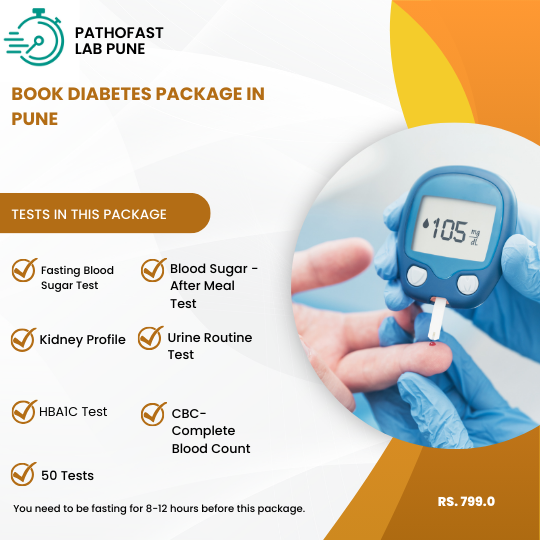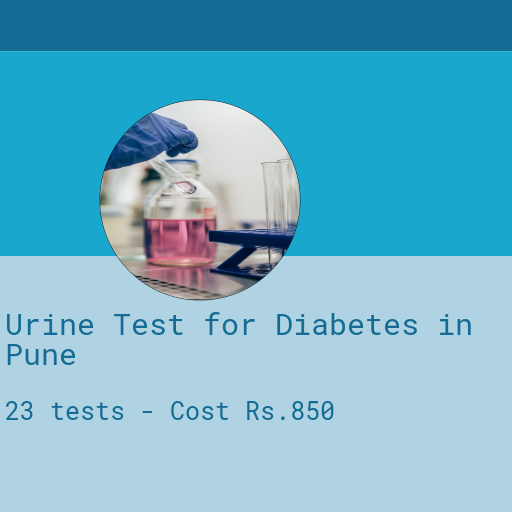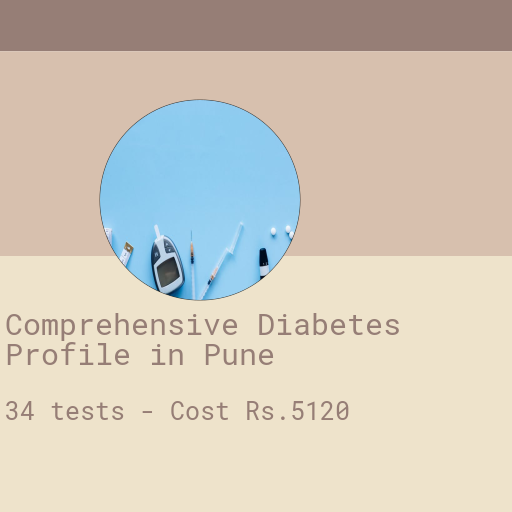Diabetes Tests in Pune: Prices, Preparation, Packages
Book a diabetes test in Pune with Pathofast Lab. Prices start at Rs.110 or a sugar Test. You need to be fasting to prepare for the test. We also offer diabetes test packages starting at Rs.999. Call the lab now to book a free home visit for diabetes test in Pune.
Table of Contents
- Diabetes Test Price in Pune
- Preparation for a Diabetes Test
- Diabetes Packages in Pune
- Finding a lab near you for Diabetes Tests in Pune?
- How to Book Diabetes Tests in Pune?
- What is Diabetes
- How to know if you have diabetes
- How is diabetes diagnosed?
- Meanings of different tests done for Diabetes
- Why Kidney should be tested in Diabetes?
- What is diabetes in pregnancy?
Diabetes Test Price in Pune
Diabetes test price in Pune starts at Rs.110 for a simple sugar test, to Rs.5120 for a premium diabetes test package. Various diabetes test packages are available starting from Rs.999, as well as specific tests like HBA1C, Insulin Test and more. The following is a list of common diabetes tests in Pune with prices.
Table of Prices of Diabetes Tests and Packages in Pune
| Category | Price List |
|---|---|
| Diabetes Tests |
|
| Diabetes Test Packages |
|
Preparation for a Diabetes Test
To prepare for a diabetes test, find out whether you need to be fasting, and whether you can take your usual medicines. The following table lists pre test preparation requirements for various common diabetes tests
Table of How to Prepare for Diabetes Tests
| Diabetes Tests | How to Prepare |
|---|---|
| Fasting Sugar Test, Insulin Test, C-peptide Test, Glucose Tolerance Test (0 hr sample) |
|
| Post-prandial Sugar Test |
|
| Glucose Tolerance Test (2 hour) |
|
| Diabetes Urine Tests, HBA1C Test |
|
Diabetes Packages in Pune
Pathofast Lab Pune offers 3 cost-friendy diabetes packages, that can help to monitor and track diabetes treatment. These are listed below
Complete Diabetes Profile
26 Tests @ Rs.999 - Best for screening and monitoring of diabetesUrine Tests for Diabetes
67 Tests @ Rs.850 - Complete checkup of urine and kidneys for damage due to diabetesDiabetes Premium Checkup
26 Tests @ Rs.5120 - Covers pancreatic hormones and all diabetes related testsFinding a lab near you for Diabetes Tests in Pune?
Pathofast Lab in Pune,Camp is centrally located and offers home sample collection services for Diabetes Tests in Pune. Home pickup is available in various areas
What is the lab's address?
2nd Floor, Manisha Terrace, 411001, Moledina Rd, Camp, Pune, Maharashtra 411001How to find the nearest center for Diabetes Tests in Pune?
Visit our center listed above or check the Center LocatorTable of locations in Pune for Diabetes Tests with prices
The following table lists areas in Pune, where home sample collection is available for Diabetes Tests. Prices charged for home visit are also listed, together with final rate for Diabetes Tests in that area.| Area/Locality in Pune | Home Sample Facility | Transport Charges |
|---|---|---|
| Diabetes Test near Jangli Maharaj Nagar | Available | 100 INR |
| Diabetes Test near Ravet | Available | 200 INR |
| Diabetes Test near Viman Nagar | Available | 150 INR |
| Diabetes Test near Shastrinagar, Yerawada | Available | 100 INR |
| Diabetes Test near NIBM Undri Road, Kondhwa | Available | 100 INR |
| Diabetes Test near Camp | Available | 0 INR |
| Diabetes Test near Aundh | Available | 200 INR |
| Diabetes Test near Baner | Available | 200 INR |
| Diabetes Test near Dattwadi | Available | 200 INR |
| Diabetes Test near Undri | Available | 200 INR |
| Diabetes Test near Pimpri-Chinchwad | Available | 200 INR |
| Diabetes Test near Kalyani Nagar | Available | 50 INR |
| Diabetes Test near Koregaon Park | Available | 50 INR |
| Diabetes Test near Sadashiv Peth | Available | 100 INR |
How to Book Diabetes Tests in Pune?
Book the Diabetes Tests in Pune, online, through watsapp or by calling the lab reception, with Pathofast Lab. Pathofast is the best lab in Pune, for Diabetes Tests Tests.Click on Add To Cart
Click the Cart Icon on the top right side of the navigation menu.
Click Checkout
Enter your Mobile Number
Enter personal details, Choose time and date for sample collection
Pay to Confirm
What is Diabetes
Diabetes is a chronic condition where the body fails to metabolize sugar correctly, resulting in elevated blood sugar levels.This occurs due to either insufficient production of insulin or the body's inability to use insulin effectively
The earliest form of diabetes, known as insulin resistance, happens when cells in the muscles, fat, and liver start ignoring the signal that insulin is trying to send out—which is to take in glucose from the bloodstream.When discussing the spectrum of this condition, it is crucial to distinguish between diabetes and prediabetes
Prediabetes is a state where blood sugar levels are higher than normal but not yet high enough to be classified as diabetes.Understanding these differences is essential for early intervention and effective management of the condition.
Different types of Diabetes
| Type of Diabetes | Age of Onset | Sugar Levels | Preferred Diagnostic Test |
|---|---|---|---|
| Type 1 Diabetes | Usually diagnosed in children and young adults | High blood sugar levels due to little or no insulin production | Insulin test |
| Type 2 Diabetes | Commonly develops in adults over the age of 45 | High blood sugar levels due to insulin resistance or deficiency | HbA1c test |
| Gestational Diabetes Mellitus (GDM) | Occurs during pregnancy | High blood sugar levels typically during the second or third trimester | Pregnancy Glucose Tolerance Test |
Genetics:
Genetics: A family history of diabetes can significantly increase the risk of developing type 2 diabetes.Obesity:
Obesity: Excess body weight, especially around the abdomen, is a major contributor to insulin resistance and type 2 diabetes.Physical Inactivity:
Physical Inactivity: Leading a sedentary lifestyle can lead to weight gain and decreased insulin sensitivity, heightening the risk of diabetes.Poor Diet:
Poor Diet: A diet high in refined sugars, fats, and processed foods can lead to weight gain and insulin resistance.Age:
Age: The risk of type 2 diabetes increases with age, particularly after the age of 45, due to a combination of aging-related factors.How to know if you have diabetes
Diabetes is a condition that often goes unnoticed until significant symptoms appear.Some common indicators include frequent urination, a constant feeling of thirst, and unexplained weight loss
Additionally, individuals may experience extreme fatigue, blurred vision, and slow healing of cuts and bruises.Recognizing these symptoms early can be crucial for effective management and treatment of diabetes.
Increased Thirst:
Increased Thirst: One of the early signs of diabetes is feeling excessively thirsty, even after drinking water.Frequent Urination:
Frequent Urination: A common symptom where you might find yourself needing to use the restroom more often than usual.Unexplained Weight Loss:
Unexplained Weight Loss: Despite eating normally, sudden and unintentional weight loss can be a sign of diabetes.Fatigue:
Fatigue: Persistent tiredness and lack of energy are often experienced by individuals with diabetes.Blurred Vision:
Blurred Vision: High blood sugar levels can cause your vision to become blurry, making it difficult to see clearly.How is diabetes diagnosed?
Diagnosing diabetes involves several tests that measure blood sugar levels to determine if they fall within a diabetic range.One of the primary diagnostic methods is the fasting glucose test, where a blood sample is taken after an overnight fast
If the fasting glucose level is more than 126 mg/dl, it indicates diabetes.Another critical test is the hba1c test, which measures average blood sugar levels over the past two to three months
An hba1c level of more than 6.4% is a strong indicator of diabetes.These tests are essential for identifying and managing diabetes effectively.
Fasting Glucose Test:
Fasting Glucose Test: This test measures your blood glucose level after an overnight fast, providing a baseline level for understanding your body's glucose management.Post Prandial Glucose Test:
Post Prandial Glucose Test: Conducted two hours after eating, this test helps determine how effectively your body processes glucose from food.Glucose Tolerance Test (gtt):
Glucose Tolerance Test (gtt): A comprehensive test where glucose levels are checked at intervals after consuming a glucose-rich drink, providing insight into how well your body handles sugar over time.Glycosylate Hemoglobin (hba1c) Test:
Glycosylate Hemoglobin (hba1c) Test: This test reflects your average blood sugar levels over the past 2-3 months, offering a long-term view of glucose control.Fasting insulin Test:
Fasting insulin Test: Measures the level of insulin in your blood after fasting, helping to evaluate insulin production and resistance.Fasting C-Peptide Test:
Fasting C-Peptide Test: Assesses the amount of C-peptide in your blood after fasting, giving insights into your pancreas's insulin production.Meanings of different tests done for Diabetes
Diagnosing diabetes involves a series of blood tests that help determine blood sugar levels and other related parameters.The most common tests include the Fasting Blood sugar (FBS) test, which measures blood glucose levels after an overnight fast, and the Hemoglobin A1c (hba1c) test, which provides an average of your blood sugar levels over the past two to three months
Additionally, the Oral Glucose Tolerance Test (OGTT) is used to evaluate how your body processes sugar after consuming a sugary drink.Each of these tests plays a crucial role in diagnosing and managing diabetes effectively.
Table explaining what common diabetes tests mean
| Test | Description | Cutoffs for Prediabetes | Cutoffs for Diabetes |
|---|---|---|---|
| Glycosylated Hemoglobin (HbA1c) | A measure of average blood glucose levels over the past 2-3 months. | 5.7% - 6.4% | ≥ 6.5% |
| Fasting Sugar | Measures blood glucose after an overnight fast. | 100 - 125 mg/dL | ≥ 126 mg/dL |
| Insulin | Evaluates the levels of insulin in the blood. | N/A | Typically, levels may vary; consult a doctor for specific cutoffs. |
| C-Peptide | Assesses how much insulin is being produced by the pancreas. | N/A | Values vary; consult a doctor for specific cutoffs. |
Why Kidney should be tested in Diabetes?
Diabetes is a chronic condition that can have serious repercussions on various organs, including the kidneys.High blood sugar levels over time can lead to kidney damage, reducing their ability to filter waste from the blood efficiently
This can progress to diabetic nephropathy, a leading cause of kidney failure.Therefore, regular kidney testing is crucial for individuals with diabetes
Early detection through these tests can help in managing and mitigating potential damage, ensuring better overall health outcomes.Routine screenings can include urine tests to check for protein leakage and blood tests to assess kidney function, making them indispensable in diabetes management.
Renal Profile:
Renal Profile: This test will tell us the creatinine value and the GFR (Glomerular Filtration Rate), which helps to know how much the kidneys are affected.Urine Albumin Creatinine Ratio:
Urine Albumin Creatinine Ratio: This test will show if proteins are leaking into the urine, which is a crucial indicator of kidney damage.Urine sugar Test:
Urine sugar Test: This test will help know the extent of diabetes, as sugar only shows in the urine above 180 mg/dL.What is diabetes in pregnancy?
Gestational diabetes mellitus (GDM) is a type of diabetes that occurs during pregnancy and usually disappears after giving birth.This condition affects how your cells use sugar (glucose) and can cause high blood sugar levels, which can impact both the mother and baby’s health
Being aware of GDM is crucial because it can lead to complications such as preeclampsia, premature birth, and an increased risk of developing type 2 diabetes later in life.Regular screening and proper management through diet, exercise, and sometimes medication can help ensure a healthy pregnancy and delivery.
Hormonal Changes:
Hormonal Changes: During pregnancy, the placenta produces hormones that can lead to insulin resistance, which can cause gestational diabetes.Obesity:
Obesity: Being overweight or obese before or during pregnancy increases the risk of developing diabetes during pregnancy.Genetic Factors:
Genetic Factors: A family history of diabetes can increase the likelihood of developing gestational diabetes.Pregnancy Glucose Tolerance Test (gtt):
Pregnancy Glucose Tolerance Test (gtt): This test measures the body's ability to metabolize glucose and is crucial for diagnosing gestational diabetes. In Pune, the prices for a gtt can vary, but typically range from ₹500 to ₹1500. Preparation involves fasting overnight and consuming a glucose solution, followed by multiple blood draws. Many healthcare facilities offer comprehensive packages that include gtt along with other prenatal tests.Glycosylated Hemoglobin (hba1c):
Glycosylated Hemoglobin (hba1c): The hba1c test provides an average blood glucose level over the past 2-3 months, making it an essential tool for monitoring long-term glucose control. The cost for an hba1c test in Pune generally falls between ₹400 and ₹1000. No special preparation is required for this test, and it can be part of a prenatal care package.insulin Tests:
insulin Tests: insulin tests measure the levels of insulin in the blood, which can help diagnose insulin resistance and diabetes. In Pune, these tests are priced between ₹600 and ₹2000. Preparation may include fasting, and some packages may combine insulin tests with other diabetes-related diagnostics to provide a comprehensive overview.Pathofast Lab Pune
Table of Contents
- Diabetes Test Price in Pune
- Preparation for a Diabetes Test
- Diabetes Packages in Pune
- Finding a lab near you for Diabetes Tests in Pune?
- How to Book Diabetes Tests in Pune?
- What is Diabetes
- How to know if you have diabetes
- How is diabetes diagnosed?
- Meanings of different tests done for Diabetes
- Why Kidney should be tested in Diabetes?
- What is diabetes in pregnancy?



